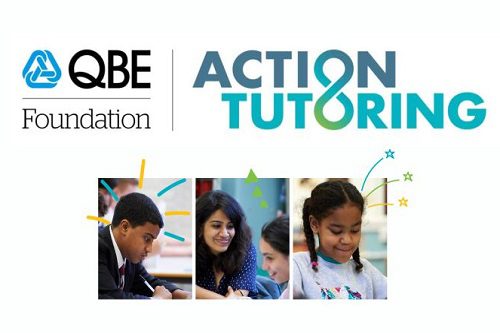QBE Foundation pledges more than £1.5 million to help disadvantaged pupils

The QBE Foundation has struck a partnership with Action Tutoring and will invest over £1.5 million to support children from disadvantaged backgrounds and plug the academic attainment gap in the UK. With the QBE Foundation funding, Action Tutoring aims to double within five years its number of pupils and reach more remote locations.
By the end of GCSEs, children from low-income backgrounds are on average 18 months behind their wealthier peers. This attainment gap was already one of the largest in the developed world before Covid-19, but lockdowns exacerbated inequalities so much that it would take a decade just to bring it back to pre-pandemic levels. Yet, the government is set to end the funding for the national tutoring programme in 2024.
“Achieving good GCSEs in both English and maths is critical to young people being able to progress to further education, employment or training. This not only benefits their individual lives but creates a healthy workforce and ultimately benefits the wider economy,” notes Susannah Hardyman, CEO, Action Tutoring. “Skills shortage is a chronic problem for businesses. This partnership aims to accelerate the recovery and fight inequality. This funding will help us tutor twice as many pupils as we do today within five years, and also expand our reach from urban to rural areas.”
Grant Clemence, Chairman, QBE Foundation, adds: “QBE is embarking on a different approach from traditional corporate philanthropy. At the point government funding is about to end, QBE is stepping in with considerable financial support to allow Action Tutoring to achieve specific outcomes that we both believe will dramatically improve the prospects for many underprivileged children. The money we provide is geared to achieving measurable progress in tackling the education attainment gap. I am delighted QBE is leading the charge in breaking new ground. Not only in relation to helping vulnerable children but also in securing their place in the workforce of the future.”
The attainment gap is the persistent inequality between children from different socioeconomic groups in academic performance. 27% of pupils in state education today are classified as disadvantaged. On average they’re 18 months behind their peers by the end of secondary school.
Action Tutoring and the QBE Foundation are committing to reduce this gap by providing free tuition to disadvantaged pupils, through partnerships with non-selective state schools, enabling these children to make meaningful academic progress and opening doors to future employment and other opportunities.
The National Audit Office warned in February this year that additional tutoring’s future is at risk as a result of the Department for Education’s decision to withdraw funding for tutoring over the next year.
The QBE Foundation has committed to a minimum of three years funding with an annual contribution of at least £500K, so a minimum commitment totalling £1.5million, but also with the expectation that the partnership and funding will extend to five years and beyond. QBE employees across the country will be able to volunteer to provide regular tutoring in local schools, using Action Tutoring’s structured programmes and resources.
This outcomes-based partnership will be a step change for Action Tutoring, allowing the charity to increase the number of UK schools it partners with.
The partnership will focus on four key outcomes over three years:
Increasing reach, with 30% of delivery based in schools outside the eight current urban hubs, with a particular focus on often overlooked rural and seaside locationsGrowing the number of pupils supported, from 6,000 in 2023 to 10,000 by 2026 and then to 12,000Reducing the attainment gap in English and Maths, with Action Tutoring pupils matching the national average pass rates for all pupils in reading SAT and English GCSEAdvocating for tutoring for disadvantaged pupils
One of the biggest failures of the education system is leaving young people with poor GCSE results without a clear path to employment. Pupils who do not achieve GCSEs are more likely to become NEET (not engaged in education, employment or training), with currently 711,000 NEET young people in the UK and each individual estimated to cost the economy £120,000 over the course of their lifetime.
Having trained volunteers deliver high-quality tutoring one-to-one or in small groups can make a big difference to children from disadvantaged backgrounds, helping them improve their learning, achieve stronger SATs and GCSE results, enhance their employment prospects and widen their life choices.
Authored by QBE





